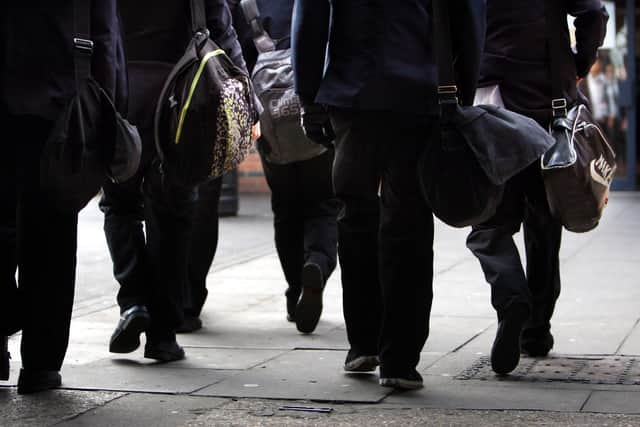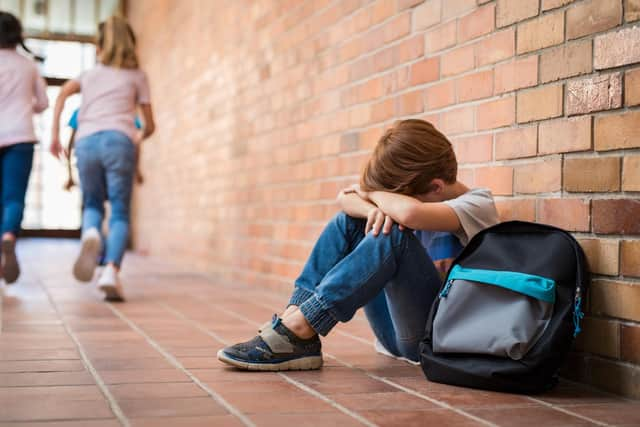School violence Scotland: SNP urged to act in wake of 'staggering' rise in use of weapons, drugs and violence
SNP ministers have been urged to take urgent action after a “staggering” new report laid bare soaring levels of violence in Scottish primary schools, with incidents often involving weapons.
The first in-depth study in of behaviour in Scottish schools since 2016 highlighted a shocking scale of disorder, with more than three-quarters of staff saying the trend has become “worse” since the pandemic.
Advertisement
Hide AdAdvertisement
Hide AdPrimary schools were found to have particular issues with physical aggression and violence, both directed at other pupils and towards staff, compared to secondary schools.


More than one in ten primary school support staff said they had encountered use of weapons in incidents between pupils in the classroom in the last week, rising to 11 per cent this year from 3 per cent in 2016.
Use of weapons was also reported by 6 per cent of primary and secondary teachers in the last week, up from below 1 per cent previously. In primary, the proportion of teachers experiencing violence around the school at least once a week between pupils is up from 32 to 46 per cent.
One primary school support staff member said: “Physical violence for me is the one thing that's really escalated. What can you do when a child's attacking you, besides keep moving away? Then if they follow you, where do you go? You've got nowhere to go.”
A council education official said: “I wouldn’t say it’s just secondary schools, and I would say its primary schools and what I would say is that we’ve noticed a real increase in that distressed and dysregulated behaviour with our younger children.”


Meanwhile, since the surveys begun in 2006, there has been a doubling of the number of primary school teachers reporting they have to deal with physical aggression between pupils in classrooms every day, from 10 per cent in 2006 to 20 per cent in 2023.
Staff warned “much higher levels of funding and support” are required if the needs of a growing number of pupils with additional support needs (ASN), and other conditions, are to “continue to be met in mainstream schools”.
The last scheduled Behaviour in Scottish Schools Research (BISSR), by the Scottish Centre for Social Research, was due in 2020, but was postponed because of the pandemic, resulting in a seven-year gap between 2016 and this year’s figures.
Advertisement
Hide AdAdvertisement
Hide AdA total of 508 primary schools and 330 secondary schools were invited to participate, with 3,754 staff responding to the survey, and almost 140 interviews carried out. Ministers have previously been reluctant to confirm reports of a rise in violence and disruptive behaviour in schools, saying they would have to wait for BISSR to obtain a clear picture.
Education secretary Jenny Gilruth hosted her latest school violence summit on Tuesday, and will present an action plan to Holyrood on Wednesday.
Overall, the BISSR study has found the number of primary teachers saying all, or almost all, pupils are well behaved in class has fallen from 87 per cent to 74 per cent since 2016, while among secondary teachers the drop is more stark, from 86 per cent to 65 per cent.
Two-thirds of school staff had encountered general verbal abuse between pupils in classrooms in the last week, 59 per cent had witnessed physical aggression and 43 per cent physical violence.
In terms of aggression and violence against staff rather than between pupils, a third had experienced general verbal abuse, 16 per cent had experienced physical aggression and 11 per cent reported physical violence in the classroom in the last week,
In secondaries, reports of encountering pupils under the influence of drugs or alcohol around the school at least once in the last week has risen among teachers from 5 per cent to 16 per cent, and in reports from head teachers it has soared from 11 per cent to 29 per cent.
Misuse of mobile phones was among the “most frequently experienced serious disruptive behaviours”, with reports among teachers rising from 14 per cent to 27 per cent.
Council bosses also “expressed concerns” about the impact of Government-backed free bus travel for under-22s, warning it had enabled young people to travel to other areas of the city to take part in fights, or to meet up on buses to engage in anti-social behaviour.
Advertisement
Hide AdAdvertisement
Hide AdThe report said: “The majority of staff reported pupils to be generally well behaved around the school (85 per cent) and in the classroom (65 per cent), and it was perceived that overall they tend to follow instruction and that they are often accepting and mindful of their peers. However, in 2023 all school staff groups reported that there was an increase in nearly every measure, from the low level to more serious disruptive behaviours.
"Serious disruptive behaviours, such as physical violence and aggression, had an immediate negative impact as a result of their very nature, but low-level behaviours, such as pupils talking out of turn, were also thought to have an insidious effect as they were more prevalent, were difficult to deal with and caused frustration and fatigue among staff members trying to deal with them.”
The report added: “The qualitative research identified new and emerging patterns of disruptive behaviour including vaping and in-school truancy, a rise in misogynistic views expressed by male pupils, and problematic use of mobile phones and social media.”
Scottish Conservative education spokesman Liam Kerr said: “This eye-opening report lays bare the staggering level of physical and verbal abuse occurring in our schools on the SNP’s watch. Every single day pupils and staff are at risk of violence or some form of abuse as a result of SNP ministers’ failure to get a grip on these issues.
“The survey makes it clear that these problems have increased substantially in recent years. It is deeply alarming to see the use of drugs and alcohol increase among pupils, as well as the levels of physical and sexist abuse rising.”
School staff said the reasons for the changes in behaviour included a perceived lack of consequences for pupils who engage in serious disruptive behaviour, a lack of support for pupils with additional support needs, particularly Autism Spectrum Disorders and ADHD, as well as disengagement from school and wider societal changes such as a general lack of respect in society, the widespread use of social media and changing approaches to parenting.Opinion differed among the survey participants as to whether the Covid-19 pandemic was the cause of changes in behaviour or had exacerbated and accelerated existing trends.
Responding to the report, Ms Gilruth said: “It is clear from the responses that most teachers report good behaviour amongst pupils – this provides some important nuance to this issue and must be at the forefront of our plans to tackle the instances of disruptive behaviours.
"Young people must not be demonised and poor behaviour cannot be generalised. Our young people have faced a huge amount of disruption in recent years due to the Covid-19 pandemic, which has been compounded by the current cost-of-living crisis. This is not unique to Scotland.”
Advertisement
Hide AdAdvertisement
Hide AdAndrea Bradley, general secretary of the Educational Institute of Scotland (EIS) teaching union, said the findings were “worrying”.
She said: “The Scottish Government and Scotland’s local authorities simply cannot ignore the evidence of the BISSR and the EIS national survey, both of which paint a deeply worrying picture of a rising tide of disruptive behaviour, aggression and violence in Scotland’s schools.
"A lack of investment in education and support for young people, coupled with societal issues such as poverty, the influence of social media, mental ill-health and the continuing aftermath of the pandemic, have created an environment where too many young people feel alienated, isolated and distressed.
"For a growing minority of young people, this is increasingly manifesting itself in unruly, disruptive or violent behaviour, including during the school day and aimed at staff or other pupils.”
Comments
Want to join the conversation? Please or to comment on this article.
